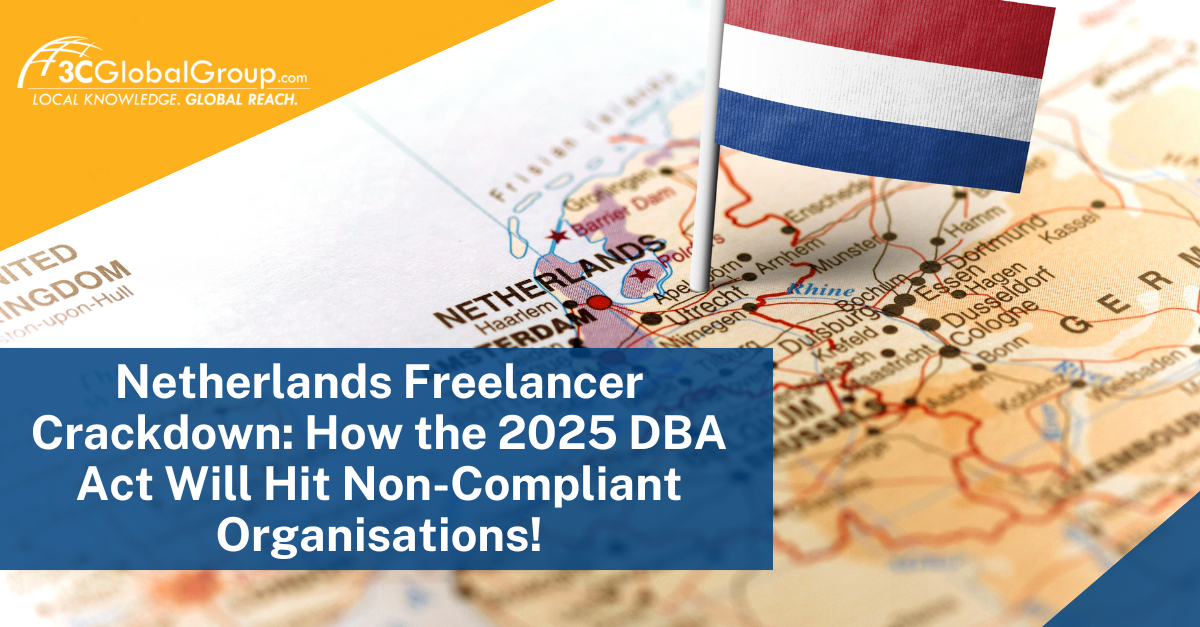
Major changes are on the way for those who engage with or work as freelancers in the Netherlands. Failure to comply with these changes can result in severe penalties for organisations. The Employment Relationships Deregulation Act, also known as the DBA Act, will be enforced by the Dutch Tax Authorities from 1st January 2025. The DBA Act will see the tax authorities carry out measures to prevent the exploitation of freelance professionals with serious penalties for those who fail to comply with the Act. This article will examine how the DBA Act will be enforced in the Netherlands, the concerns surrounding its implementation, and how you can prepare to ensure compliance with this law and protect your organisation from the costly risks of non-compliance.
Why is the DBA Act changing?
The previous version of the DBA Act was introduced into legislation in May 2016; however, it was criticised for not being effective enough to curb worker misclassification. The earlier version saw minimal enforcement of the law, often only in situations where direct violation of the Act was found. With the number of people registered as self-employed rising in recent years, the need for an updated version of the Act was increasingly apparent.
Over the past decade, the number of freelancers working in the Netherlands has grown exponentially by over 85%, with the Dutch Chamber of Commerce (KvK) reporting 1.2 million self-employed people. In the Netherlands, it is estimated that 13% of self-employed individuals may be classified as falsely self-employed, particularly in sectors like government, IT, media, and communication. Correct worker classification is imperative when working with freelancers and contractors to comply with local employment laws. Learn more about why correct contractor classification matters here.
What changes are to be implemented?
Starting January 2025, new self-employment regulations will be enforced in an effort to create equal conditions for salaried and self-employed employees. The enforcement of these regulations will be swift, and penalties for non-compliance will be stringent. The Act will see Dutch tax authorities carefully examine the working relationships between freelancers (or ZZP'ers) and their clients to determine if any are "falsely self-employed." A freelancer could be categorised under this title if they primarily work for one client but should instead be categorised as a direct employee of that company. Initially, these checks will target businesses that are in violation of the new rules of the DBA Act rather than the people themselves who are categorised as freelancers. Therefore, businesses must fully comprehend the updated regulations or risk legal and financial fallout as a result.
Under the updated rules, a person qualifies as self-employed if they assume financial risks, use their own equipment, possess specialised skills needed by the company, and are recognised as freelancers while performing their tasks. Additionally, freelancers should work with multiple clients and avoid long-term contracts with a single client to avoid violating the Act.
How will the DBA Act be enforced?
The Employment Relationships Deregulation Act will come into force on 1st January 2025 with stringent penalties for organisations violating the regulations. From this date, Dutch tax authorities will directly issue fines in addition to requiring corrective actions and additional tax assessments from those in breach of the Act. Those who are found to be in violation of the Act will be required to pay retroactive taxes from the enforcement start date. In cases of intentional rule evasion, the tax authorities in the Netherlands may extend retroactive assessments for the previous five years instead of resulting in extensive back-pay liabilities. Therefore, it is imperative that organisations adequately prepare for the Act's rollout or face legal and financial penalties.
Before the DBA act comes into force, the tax authorities in the Netherlands will issue warnings to those they believe to be unintentionally breaching the law. However, those found to be evading warnings or intentionally breaching the law will face potential fines, retroactive taxes, and assessments.
Concerns:
Many concerns surround the upcoming implementation of the updated Employment Relationships Deregulation Act from freelancers and organisations representing freelance workers. Concerns have been highlighted that the new regulations may cost freelancers work as clients may withdraw opportunities due to the increased scrutiny and risk of non-compliance. Due to this, some political parties have called on the tax authorities to focus instead on the sectors in which violations of the Act are more common.
In a recent article, we examined a study by the Dutch banking Organisation Knabb. The study highlighted the concerns of self-employed workers surrounding the upcoming Employment Relationships Deregulation Act implementation. To read the full article, in which we list the findings in more detail, check out the article here.
Ensure compliance and correct classification with 3C Global Group:
As discussed, correct classification when working with freelancers in the Netherlands is imperative. Failure to classify freelancers correctly can put an organisation in violation of the DBA Act, and it may face a range of serious penalties for incompliance. Regarding the changing legislation in the Netherlands, our team at 3C Global strives to ensure comprehensive compliance with all relevant legislation so that our clients can have peace of mind. Please do not hesitate to contact us today to get started in the Netherlands!
Want to see more content like this? Sign up for our newsletter for the latest industry insights and company news.


